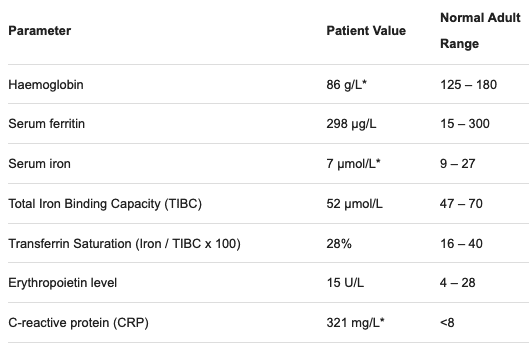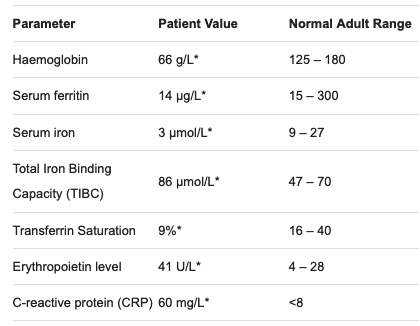CICM SAQ 2015.1 Q18
Question
18.1 The following data refer to a 65-year-old male admitted to ICU with septic shock on a background of active rheumatoid arthritis.
- a) What abnormality is demonstrated in this patient? Give your reasoning. (20% marks)
- b) What is the pathogenesis of these changes? (20% marks)
- c) What specific treatment strategy would correct the demonstrated abnormality? (10% marks)
18.2 The following data refer to a 48-year-old female admitted electively to ICU following extensive pelvic surgery for invasive endometrial carcinoma. The patient has remained in ICU for 22 days because of complications including acute kidney injury.
- a) What abnormality is demonstrated in this patient? Give your reasoning. (20% marks)
- b) Give two potential causative factors in this patient. (10% marks)
- c) Briefly outline the available treatment options to correct the demonstrated abnormality including any disadvantages / risks. (20% marks)
Answer
Answer and interpretation
18.1 a) Anaemia of Inflammation demonstrated by:
- decreased haemoglobin
- decreased iron
- normal to high ferritin
- suppressed erythropoietin
- elevated CRP
b) Inflammation -> cytokines (IL6) -> increased hepcidin -> decreased iron release from bone marrow, decreased iron release from macrophages, decreased absorption of iron -> suppressed erythopoeisis
c) Control inflammation, no value to iron replacement, no value to the use of erythropoietin.
18.2 a) Iron deficiency anaemia as evidenced by:
- decreased haemoglobin
- decreased iron
- decreased ferritin
- increased erythropoietin
- increased TIBC.
b) Blood loss; Pre-existing dietary deficiency
c)
- IV iron replacement – no demonstrated benefit and risks of adverse effects (awaiting Ironman study)
- Oral iron replacement
- Erythropoeitin – expensive and no demonstrated benefit
- Blood transfusion – risks of transfusion including immunosuppression
- Nil – may have reduced oxygen carrying capacity for some time until correction of Hb

Examination Library
CICM
Chris is an Intensivist and ECMO specialist at The Alfred ICU, where he is Deputy Director (Education). He is a Clinical Adjunct Associate Professor at Monash University, the Lead for the Clinician Educator Incubator programme, and a CICM First Part Examiner.
He is an internationally recognised Clinician Educator with a passion for helping clinicians learn and for improving the clinical performance of individuals and collectives. He was one of the founders of the FOAM movement (Free Open-Access Medical education) has been recognised for his contributions to education with awards from ANZICS, ANZAHPE, and ACEM.
His one great achievement is being the father of three amazing children.
On Bluesky, he is @precordialthump.bsky.social and on the site that Elon has screwed up, he is @precordialthump.
| INTENSIVE | RAGE | Resuscitology | SMACC


